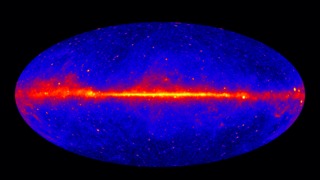GLAST First Light All Sky Map
NASA's newest observatory, the Gamma-Ray Large Area Space Telescope (GLAST), has begun its mission of exploring the universe in high-energy gamma rays. The spacecraft and its revolutionary instruments passed their orbital checkout with flying colors. NASA announced today that GLAST has been renamed the Fermi Gamma-ray Space Telescope. The new name honors Prof. Enrico Fermi (1901 - 1954), a pioneer in high-energy physics. Scientists expect Fermi will discover many new pulsars in our own galaxy, reveal powerful processes near supermassive black holes at the cores of thousands of active galaxies across, and enable a search for signs of new physical laws.
Orthographic Map
Astronomers wrapped the Fermi Gamma-ray Space Telescope's first all-sky map over a sphere to produce this view of the gamma-ray universe. The globe in this animation rotates showing the galactic plane and the north galactic pole, then tilts up to show the south galactic pole region.
Vela Pulsar
Gas and dust in the plane of the Milky Way glows in gamma rays thanks to collisions with accelerated nuclei called cosmic rays. The famous Crab Nebula and Vela pulsars also shine brightly at these wavelengths. This animated close-up shows the Vela pulsar, which beams radiation every 89 milliseconds as it spins. The pulses are shown slowed down by a factor of 20.

First Light All-Sky Map
This all-sky image shows bright emission in the plane of the Milky Way (center), bright pulsars, and supermassive black holes. The map combines 95 hours of the LAT instrument's "first light" observations.
Credits
Please give credit for this item to:
NASA/Goddard Space Flight Center
-
Producer
- Stefanie Misztal (UMBC)
-
Scientist
- Steven Ritz (NASA/GSFC)
Release date
This page was originally published on Tuesday, August 26, 2008.
This page was last updated on Wednesday, May 3, 2023 at 1:55 PM EDT.
Missions
This page is related to the following missions:Series
This page can be found in the following series:Datasets used
-
[Fermi: LAT]
ID: 216Fermi Gamma-ray Large Area Space Telescope (GLAST) Large Area Telescope (LAT)
This dataset can be found at: http://fermi.gsfc.nasa.gov
See all pages that use this dataset -
[Fermi]
ID: 687
Note: While we identify the data sets used on this page, we do not store any further details, nor the data sets themselves on our site.
